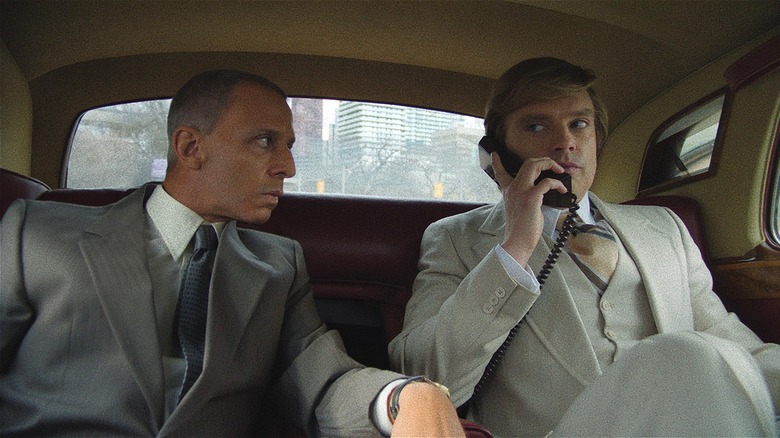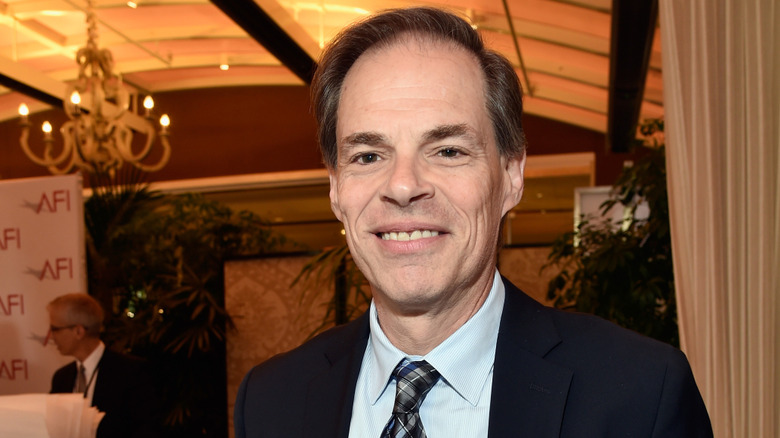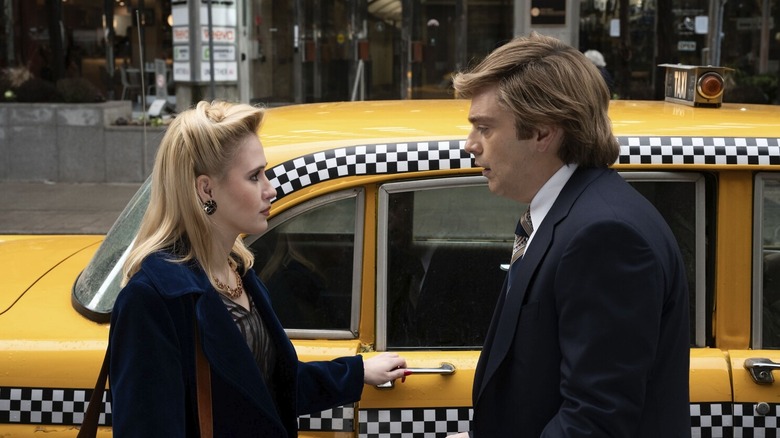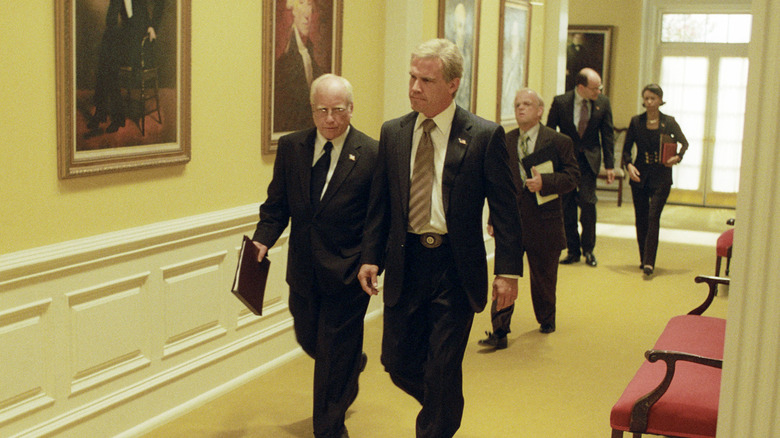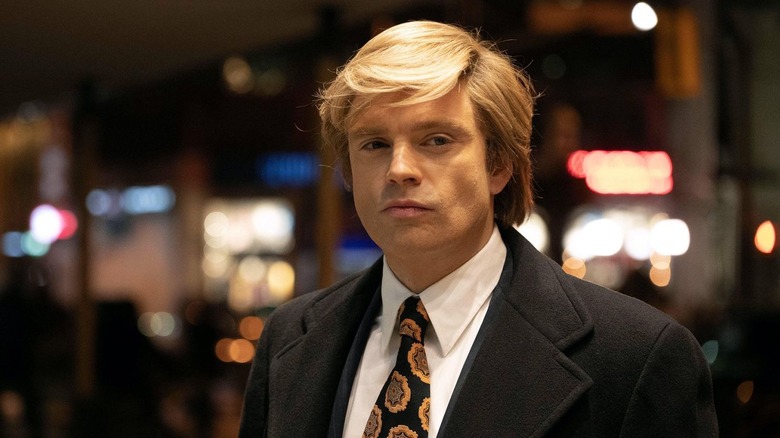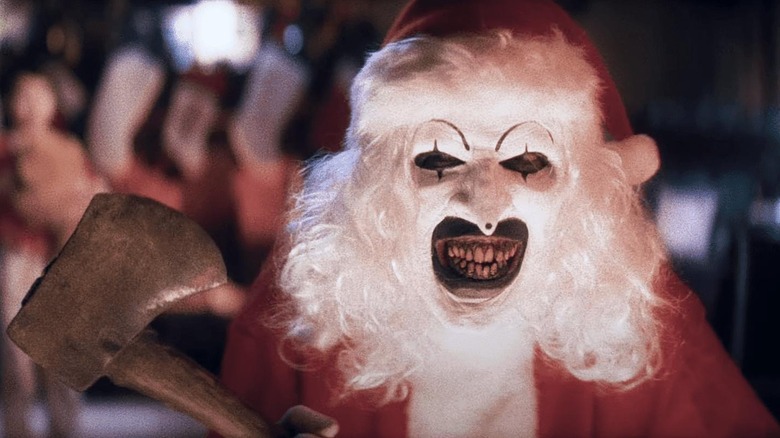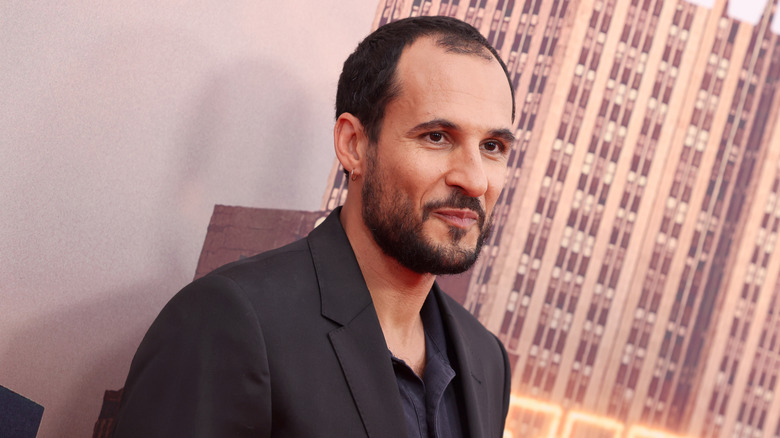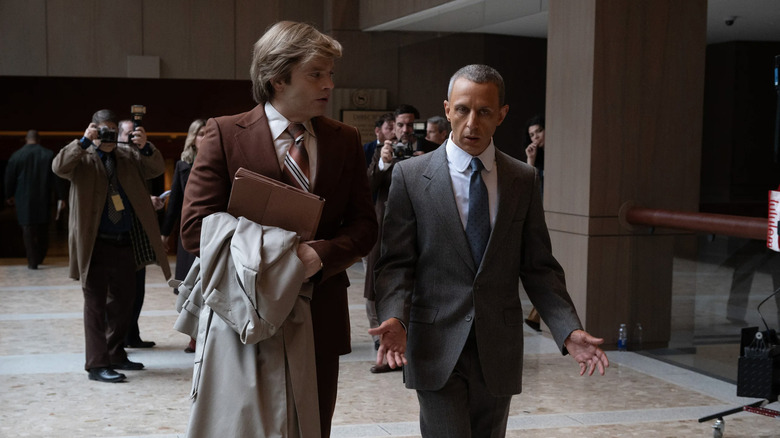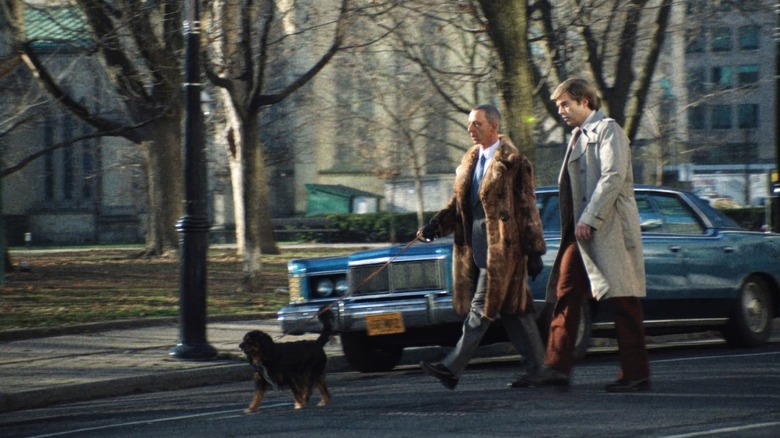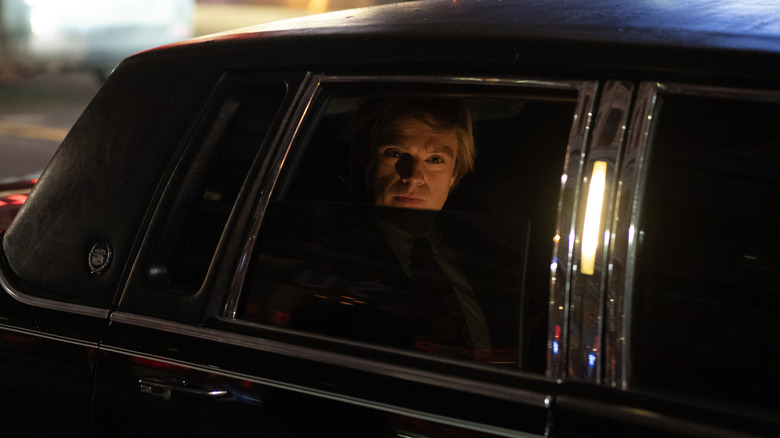Why The Donald Trump Movie The Apprentice Bombed At The Box Office
After a lengthy, tormented road to the big screen, "The Apprentice," a new movie focusing on Donald Trump's (Sebastian Stan) formative friendship with the malicious attorney Roy Cohn (Jeremy Strong) in the 1970s, finally hit movie theaters on October 11, 2024. Launching in a significant number of theaters, "The Apprentice" proved an instant box office bomb. Opening to just $1.61 million, "The Apprentice" had the fourth-worst wide release opening weekend of any 2024 title opening in over 1,500 theaters.
These figures instantly ensured "The Apprentice" a place among the biggest box office bombs of 2024. Unless it proves as leggy as "Elemental" or "The Greatest Showman," "The Apprentice" is destined to lose millions. Though the box office figures are dismal, this Ali Abbasi-directed film never seemed poised for a lucrative performance in theaters. From the very beginning, "The Apprentice" faced endless challenges. For one thing, politically-conscious films about currently relevant politicians are always a tough sell to moviegoers no matter the era. Then Sebastian Stan's Donald Trump movie left one investor furious, thus inciting a media and legal circus that overshadowed the film itself.
Further complicating matters was the mixed box office track record of the movie's two leading men. Though it focused on a globally-recognizable political figure, "The Apprentice" was never a sure-fire moneymaker. That's an overwhelming reality that becomes even more starkly clear as we break down why it bombed at the box office.
Sebastian Stan isn't a box office draw
Credit where credit is due to Sebastian Stan, who's bypassed easy blockbuster paychecks outside of his Marvel Studios exploits. What fans probably never knew about Sebastian Stan is his affinity for headlining artsier titles when he's not playing Bucky Barnes/The Winter Soldier. That's stretched him in exciting directions as an actor, particularly in his dramatic transformation for A24's outstanding "A Different Man."
These artistically enriching exercises have come at a cost, though. Stan's persistent presence in indies has ensured he isn't much of a big screen draw for general moviegoers. Describing something as "a Sebastain Stan movie" doesn't move the needle for many people. After all, his most acclaimed movies have been smaller-scale titles most folks haven't seen.
That's where some of the greatest financial struggles for "The Apprentice" came from. Hinging so much of the marketing on seeing Stan inhabit the Donald Trump persona didn't pack the same wallop as a bigger name like Bradley Cooper or Leonardo DiCaprio taking the part. Plus there wasn't a massive Stan fanbase that could come out in droves to see "The Apprentice." This actor just doesn't have that cultural awareness when he isn't costarring in Marvel titles. Stan's relative inexperience as a box office draw, then, had no chance of bolstering the movie's odds of becoming a hit.
The Apprentice has a tiny distributor
Tom Ortenberg's extensive history in the film business expanded in 2018 to include creating newbie distributor Briarcliff Entertainment. Ortenberg's previous studio, Open Road Films, hit the ground running with multiple theatrical movies a year, but Briarcliff has had a more tormented history. After releasing only four titles in 2018 and 2019, the label briefly went dormant when Ortenberg revived Open Road. When those pursuits ended, Ortenberg returned to focusing on Briarcliff, with "The Apprentice" serving as one of the label's first big "comeback" projects.
Per Ortenberg, Briarcliff has so little money that the costs of acquiring and promoting movies come directly out of his bank account. Now, minimal resources to market a feature does not equal a box office flop, as mega-hit "Terrifier 3" can attest. However, it helps if you have a pre-existing fanbase or a really good hook to compensate for the lack of TV spots and billboards. It also doesn't hurt to have a distributor at your disposal with experience launching significant indie hits.
Briarcliff does not have that track record: So minimal were the resources at this distributor that the "Apprentice" producers started a Kickstarter to help keep the movie in theaters for more than one weekend. That task will be extra difficult after its disastrous opening weekend. Ortenberg has had many highs in his career, including overseeing best picture Oscar winner "Spotlight." Unfortunately, the limitations of his Briarcliff outfit only compounded several commercial problems ingrained into "The Apprentice."
The Apprentice had little time to prepare a theatrical run
In the aftermath of its opening weekend, Briarcliff founder Tom Ortenberg expressed relief that "The Apprentice" had even come out at all. "The Apprentice" was only cleared for domestic theatrical release just six weeks before its October 11 release date. Legal issues involving one of the film's financiers and other matters prevented the feature from getting an official North American release strategy together much sooner.
That aspect alone speaks to why "The Apprentice" performed especially poorly. It's hard even for major studios to launch big tentpoles with only a small timeframe. Movies take time to introduce themselves to the public and develop qualities that render them must-see events. A relatively new distributor like Briarcliff, meanwhile, had just a handful of weeks to sell "The Apprentice" to the public.
During those six weeks, there wasn't a deluge of lucrative adult dramas that trailers for "The Apprentice" could be attached to. There weren't even other Briarcliff movies launching in that timeframe that could give "The Apprentice" a promotional boost. Worse, the official go-ahead for a domestic release came months after the film's May 2024 Cannes premiere. All the potential buzz and festival hype on this title had long since vanished. Any way you look at it, timing was not in favor of "The Apprentice."
Political films have a mixed track record
In 1995, director Oliver Stone and actor Anthony Hopkins, four years after having hits with "JFK" and "The Silence of the Lambs" respectively, delivered "Nixon." Two titans of early '90s cinema making a movie about an infamous president should have been a must-see event. Instead, "Nixon" sank without a trace at the global box office.
Over the years, many other movies about real-life political figures have underperformed at the box office. "W." flamed out in 2008, while "J. Edgar," starring Leonardo DiCaprio, tanked in 2011. Meanwhile, 2018's much-hyped "Vice" came nowhere near close to recouping its hefty $60 million budget. These titles are a hard sell to the general public in the best of times, or even with a movie star like DiCaprio in the lead role.
"The Apprentice" was the latest movie to succumb to this phenomenon. Once again, audiences eschewed the chance to watch a motion picture about a real-world political figure. Like late 2010s titles such as "Snowden" or "Chappaquiddick," "The Apprentice" looked like it didn't offer much more than what people could see in the average news headline. Plus moviegoers, even going back to the '90s, tend to go to movies for escapism rather than being explicitly reminded of real-world corruption. If "The Insider" or "Nixon" couldn't flourish financially in 1999 and 1995, respectively, "The Apprentice" didn't have a prayer for box office victory in 2024.
The Apprentice got generally mixed reviews
After the high-profile Cannes premiere of "The Apprentice," audiences and critics were talking about how its most provocative sequences painted a negative portrait of Donald Trump. However, what wasn't on everybody's lips was universal praise for the film itself. "The Apprentice" secured a divisive reception after its premiere. While some critics hailed it as a cinematic Molotov cocktail thrown at people in positions of power, others found it a rudimentary exercise that didn't have anything new to say about its central subject.
For many wide-release movies, like "It Ends With Us" or "Terrifier 3," mixed reviews wouldn't be anywhere near enough to deter curious moviegoers. However, "The Apprentice" belongs to the adult drama domain. The key demographics for this strain of cinema are very conscious of reviews and determine moviegoing options based on buzz, but "The Apprentice" didn't have anywhere near enough critical fervor to win over uncertain moviegoers.
Even positive reviews didn't emphasize the thrilling or absorbing elements that general audiences tend to seek out when choosing theatrical movies. "The Apprentice" garnered its strongest critical marks for its commitment to a bleak tone, which likely further alienated people. As a cherry on top, premiering five months after that Cannes debut meant that "The Apprentice" had been simmering in a divisive reputation for eons before it hit theaters. This provocative drama arrived at multiplexes not as a conquering hero, but as a much more complicated and non-mainstream creation.
There was lots of R-rated competition
The weekend "The Apprentice" opened, audiences weren't starved for R-rated options at their local multiplexes. Going wide against "The Apprentice" was "Saturday Night," while newcomer "Terrifier 3" blew everyone away at the box office with its gargantuan opening weekend. The R-rated competition wasn't limited to just these two movies either. Still lingering in theaters were holdovers "Joker: Folie a Deux" and "The Substance." Plus, arthouse theaters had various limited release R-rated titles to choose from.
If you wanted a PG-13 teen romance drama or PG live-action family movie in mid-October 2024, you were out of luck. The marketplace was largely dominated by R-rated titles, many of them from indie outfits like Briarcliff Entertainment. With countless adult-skewing options to contend with, "The Apprentice" wasn't automatically the number one moviegoing option for audiences over 17. Instead, it was just one of many R-rated movies vying for the eyeballs of adult patrons. Several of those other titles belonged to pre-existing franchises with significant fanbases. Plus competing R-rated titles like "Terrifier 3" were more escapist and tied directly into the spooky Halloween season.
Speaking of "Terrifier 3," that feature's various grisly unrated murders inspired the kind of widespread chatter and provocative discussion that "The Apprentice" once hoped to generate. Who cared about a Donald Trump movie when Art the Clown was up to his usual gory mischief? That, plus a gold rush of big screen options for older moviegoers, helped ensure the box office demise of "The Apprentice."
It lacked a household name director
After directing the movies "Holy Spider" and "Border," not to mention helming episodes of "The Last of Us," filmmaker Ali Abbasi has become a critical darling. With "The Apprentice," Abbasi made his big inaugural foray into English-language feature films. Not only that, but he got to work with well-known names like Sebastian Stan and Jeremy Strong, a sharp contrast to the globally obscure names populating his earlier works.
What was a big event for certain movie nerds, though, barely registered on the general pop culture radar. Abbasi's name, proudly displayed on marketing materials for "The Apprentice," didn't make much of an impact either way at the box office. Perhaps a household name filmmaker — a Christopher Nolan or Paul Thomas Anderson with decades of acclaim under their respective belts — might have turned "The Apprentice" into a must-see event. Having such an artist around certainly couldn't have diluted its appeal further.
Abassi, however, didn't have the fanbase or notoriety to be a selling point. His earlier works also haven't become well-known, ensuring that "The Apprentice" couldn't ride a wave of renewed social media appreciation for, say, "Border." The absence of an especially high-profile filmmaker was just another stumbling block keeping "The Apprentice" from popping at the box office.
Jeremy Strong is untested as a movie star
In the years just before "Succession" debuted in 2018, Jeremy Strong was everywhere, doing character roles for some of the biggest directors around. Starting in 2012 with a small part in "Lincoln," Strong showed up in movies like "Selma," "The Big Short," "Molly's Game," and even two different Kathryn Bigelow features. Playing Kendall Roy on "Succession," meanwhile, yielded Emmy and Golden Globes glory for the actor. The man behind Roy Cohn in "The Apprentice" has already cultivated an impressive career, but that doesn't mean he's automatically a box office powerhouse.
One problem Strong has had is that he has only appeared in two theatrical movies (including "The Apprentice") since January 2020. In other words, he hasn't shown up in a bevy of big-screen hits since he started headlining "Succession" to transform him into as much of a theatrical draw as he is on HBO. Meanwhile, Strong's biggest film roles up to this point have been supporting parts in star-studded ensemble casts.
Giving him equal billing to Sebastian Stan in a Donald Trump movie was a bold gambit. On top of that, Roy Cohn is far from a household name as a political figure, so the concept of Strong playing such an infamous man didn't hold much innate allure to moviegoers. All of that ensured that even an esteemed performer like Strong couldn't give "The Apprentice" an extra boost at the box office.
The film's audience was too niche
Some of 2024's biggest hits once again reaffirm that the key to box office success in the modern world is resonating with Black and Latino moviegoers. These audiences make up a significant chunk of the audience for the biggest motion pictures domestically of any given year. If you overperform with these demos, your movie is off to the races at the box office.
So it would be a gross understatement to say "The Apprentice" failed to win over such viewers. Once its dreadful box office figures came in, it was clear that 72% of its opening weekend audience was White. Just 10% was Latino while another 10% was Black. By contrast, the 2020 arthouse hit "Everything Everywhere All at Once" scored a whopping 50% of its first four weekends of box office revenue from audiences of color.
Meanwhile, one of 2023's biggest limited release titles was the Spanish-language drama "Radical." Some of the other largest arthouse films of that year were also anchored by non-White leads, such as "Past Lives" or "American Fiction." Non-White moviegoers don't just show up for massive tentpoles. They come out for any movie that looks interesting. This includes smaller independent features made far outside the Hollywood studio system. "The Apprentice" could have benefited from that reality, but its storyline and marketing had minimal to zero appeal to non-White audiences. Having such niche appeal solidified its box office fate and the need to appeal to audiences of color in one fell swoop.
Releasing the movie in the election cycle was a mistake
The frantic nature of the various legal woes surrounding "The Apprentice" was exacerbated by the producers' desire to get the film out in time for the 2024 election cycle. This was intended to give the project a sense of urgent relevancy that audiences simply couldn't miss out on. Instead, this swing at tying into real-world events backfired big time. The film cratered just a few weeks before Election Day, reflecting a problem nobody involved in "The Apprentice" could solve.
How do you make the movie seem special when there's wall-to-wall media coverage of Trump? What makes "The Apprentice" special and worth expensive movie theater ticket prices? These questions never really got answered by the film's overly self-knowing marketing campaign. This promotional strategy included a trailer which featured clips from the movie cheekily winking at Trump's future in politics.
The movie's very existence evoked Trump's massive stature in the political space. After all, why would this movie exist if Trump wasn't the face of the GOP and American politics for the last decade? Constantly reminding people of the political zeitgeist made "The Apprentice" seem like it was hammering home uncomfortable aspects of reality people already had trouble evading. Who wanted to voluntarily pay money to experience even more of a media figure nobody can escape? Trump's omnipresence was supposed to help "The Apprentice." Instead, it sealed its irrelevancy to most prospective moviegoers.
The Apprentice's controversies overshadowed the movie
Sometimes, controversy can be a movie's best friend, although it tends to work better for films with right-wing/Christian fanbases. The ceaseless pre-release media fervor around "The Passion of the Christ" and its potentially antisemitic material, for instance, turned the film into a rallying cry for various Christian moviegoers, who saw themselves as being as oppressed as Jesus himself. These demographics flock to motion pictures reaffirming an "us vs. them" worldview.
On the other hand, it's much harder for other types of films to overcome endless pre-release media scrutiny. The qualities that made "Sound of Freedom" blow everyone away at the box office, for instance, can undercut a superhero film or R-rated comedy. Even a politically-conscious drama like "The Apprentice" showed the dangers of leaning on controversy to get people into the theater.
Ever since its Cannes debut, "The Apprentice" spurred conversation and discourse over its brutal material as well as a sequence depicting Ivana Trump's (later rescinded) allegation that Donald sexually assaulted her. However, the vast majority of "controversy" surrounding the film starting in June, as financier Kinematics tried to get out of its involvement with the movie. This is a very "unsexy" form of controversy that would only make sense or appeal to hardcore film geeks. For everyone else, it just connected "The Apprentice" to tedious legal jargon. In short, "The Apprentice" could not match "The Passion of the Christ" in turning controversy into box office gold.
If you or anyone you know has been a victim of sexual assault, help is available. Visit the RAINN website or contact RAINN's National Helpline at 1-800-656-HOPE (4673).
